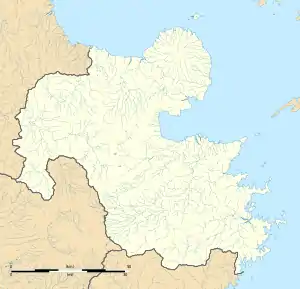Naokawa Station 直川駅 | |||||||||||
|---|---|---|---|---|---|---|---|---|---|---|---|
 Naokawa Station in July 2009 | |||||||||||
| General information | |||||||||||
| Location | Naokawa Oaza Kaminaomi, Saiki-shi, Ōita-ken 879-3102 Japan | ||||||||||
| Coordinates | 32°53′56″N 131°46′47″E / 32.89889°N 131.77972°E | ||||||||||
| Operated by | |||||||||||
| Line(s) | ■ Nippō Main Line | ||||||||||
| Distance | 213.6 km from Kokura | ||||||||||
| Platforms | 1 island platform | ||||||||||
| Tracks | 2 | ||||||||||
| Construction | |||||||||||
| Accessible | No - platform accessed by footbridge | ||||||||||
| Other information | |||||||||||
| Status | Unattended | ||||||||||
| Website | Official website | ||||||||||
| History | |||||||||||
| Opened | 20 November 1920 | ||||||||||
| Previous names | Gonohara (until 1961) | ||||||||||
| Passengers | |||||||||||
| FY2015 | 15 | ||||||||||
| Services | |||||||||||
| |||||||||||
| Location | |||||||||||
 Naokawa Station Location within Oita Prefecture  Naokawa Station Naokawa Station (Japan) | |||||||||||
Naokawa Station (直川駅, Naokawa-eki) is a passenger railway station located in the city of Saiki, Ōita, Japan, operated by Kyūshū Railway Company (JR Kyushu).[1]
Lines
Naokawa Station is served by the Nippō Main Line and is located 213.6 km from the starting point of the line at Kokura.[2]
Layout
The station, which is not staffed, consists of an island platform serving two tracks. There is no station building, but only a shelter on the platform. Access to the island platform is by means of a footbridge.[2]
Platforms
| 1 | ■ ■ Nippō Main Line | for Nobeoka |
| 2 | ■ ■ Nippō Main Line | for Saiki |
History
The private Kyushu Railway had, by 1909, through acquisition and its own expansion, established a track from Kokura to Yanagigaura. The Kyushu Railway was nationalised on 1 July 1907. Japanese Government Railways (JGR), designated the track as the Hōshū Main Line on 12 October 1909 and expanded it southwards in phases, with this station opening on 20 November 1920 with the name Gonohara (神原) as the new southern terminus. On 26 March 1922, Gonohara became a through-station when the track was extended to Shigeoka. On 15 December 1923, the Hōshū Main Line which served the station had linked up with the Miyazaki Main Line to the south. Through traffic was established from Kokura to Miyakonojō. The entire stretch of track was then renamed the Nippō Main Line. On 20 March 1961, Gonohara was renamed Naokawa. With the privatization of Japanese National Railways (JNR), the successor of JGR, on 1 April 1987, the station came under the control of JR Kyushu.[3][4]
Passenger statistics
In fiscal 2015, there were a total of 5,613 boarding passengers, giving a daily average of 15 passengers.[5]
Surrounding area
- Saiki City Naokawa Promotion Bureau Office (formerly Naokawa Village Hall)
- Naokawa District Community Center
- Saiki City Naokawa Junior High School
- Saiki City Naokawa Elementary School
See also
References
- ↑ "JR Kyushu Route Map" (PDF). JR Kyushu. Retrieved 23 February 2018.
- 1 2 Kawashima, Ryōzō (2013). 図説: 日本の鉄道 四国・九州ライン 全線・全駅・全配線・第6巻 熊本 大分 エリア [Japan Railways Illustrated. Shikoku and Kyushu. All lines, all stations, all track layouts. Volume 6 Kumamoto Ōita Area] (in Japanese). Kodansha. pp. 48, 83. ISBN 9784062951654.
- ↑ Ishino, Tetsu; et al., eds. (1998). 停車場変遷大事典 国鉄・JR編 [Station Transition Directory – JNR/JR] (in Japanese). Vol. I. Tokyo: JTB Corporation. pp. 228–9. ISBN 4-533-02980-9.
- ↑ Ishino, Tetsu; et al., eds. (1998). 停車場変遷大事典 国鉄・JR編 [Station Transition Directory – JNR/JR] (in Japanese). Vol. II. Tokyo: JTB Corporation. p. 756. ISBN 4-533-02980-9.
- ↑ "平成28年版 大分県統計年鑑 11 運輸および通信" [Oita Prefecture Statistics Yearbook 2016 Edition Section 11 Transportation and Communications]. Oita Prefectural Government website. Archived from the original on 5 December 2019. Retrieved 8 April 2018. See table 128 Transport situation by individual railway stations (JR Kyushu JR Freight).
External links
![]() Media related to Naokawa Station at Wikimedia Commons
Media related to Naokawa Station at Wikimedia Commons
- Official website (in Japanese)